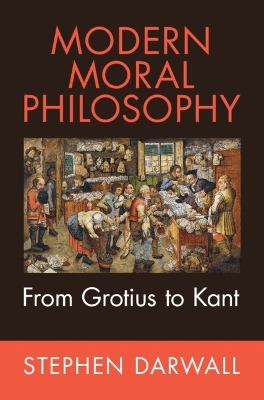
Modern Moral Philosophy
From Grotius to Kant
Seiten
2023
Cambridge University Press (Verlag)
978-0-521-86047-5 (ISBN)
Cambridge University Press (Verlag)
978-0-521-86047-5 (ISBN)
This magisterial study tells the story of a new way of doing ethics, starting in the seventeenth century, that was based on secular ideas of human psychology and universal accountability. It also shows that this modern approach remains relevant to us today and that it has a vibrant future.
In this magisterial study, one of our leading moral philosophers refutes the charge (originally made by Elizabeth Anscombe) that modern ethics is incoherent because it essentially depends on theological and religious assumptions that it cannot acknowledge. Stephen Darwall's panoramic picture starts with the seventeenth-century thinker Grotius and tells the story continuously down to the time of Kant, exploring what was in fact a completely new way of doing ethics based on secular ideas of human psychology and universal accountability. He shows that thinkers from Grotius to Kant are profoundly united by this modern approach, and that it helped them to create a theory of natural human rights that remains of great political relevance today. He further shows that this new way of thinking provides conceptual resources that are far from exhausted, and that moral philosophy in this idiom still has a vibrant future.
In this magisterial study, one of our leading moral philosophers refutes the charge (originally made by Elizabeth Anscombe) that modern ethics is incoherent because it essentially depends on theological and religious assumptions that it cannot acknowledge. Stephen Darwall's panoramic picture starts with the seventeenth-century thinker Grotius and tells the story continuously down to the time of Kant, exploring what was in fact a completely new way of doing ethics based on secular ideas of human psychology and universal accountability. He shows that thinkers from Grotius to Kant are profoundly united by this modern approach, and that it helped them to create a theory of natural human rights that remains of great political relevance today. He further shows that this new way of thinking provides conceptual resources that are far from exhausted, and that moral philosophy in this idiom still has a vibrant future.
Stephen Darwall teaches philosophy at Yale University. He is the author of The British Moralists and the Internal 'Ought', 1640–1740 (Cambridge University Press, 1995), and of many other publications in moral philosophy and its history, including The Second-Person Standpoint: Morality, Respect, and Accountability (2006).
1. Grotius; 2. Hobbes and Pufendorf; 3. Locke and Cumberland; 4. Spinoza, Cudworth, Shaftesbury, and Leibniz; 5. Hutcheson and Butler; 6. Hume and Smith; 7. The British Rationalists and Reid; 8. Rousseau and Kant.
| Erscheinungsdatum | 13.08.2022 |
|---|---|
| Zusatzinfo | Worked examples or Exercises |
| Verlagsort | Cambridge |
| Sprache | englisch |
| Maße | 158 x 235 mm |
| Gewicht | 690 g |
| Themenwelt | Geisteswissenschaften ► Philosophie ► Ethik |
| ISBN-10 | 0-521-86047-4 / 0521860474 |
| ISBN-13 | 978-0-521-86047-5 / 9780521860475 |
| Zustand | Neuware |
| Informationen gemäß Produktsicherheitsverordnung (GPSR) | |
| Haben Sie eine Frage zum Produkt? |
Mehr entdecken
aus dem Bereich
aus dem Bereich


